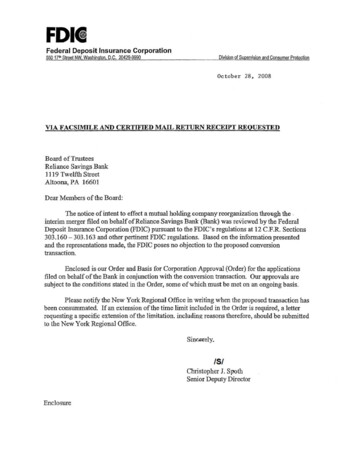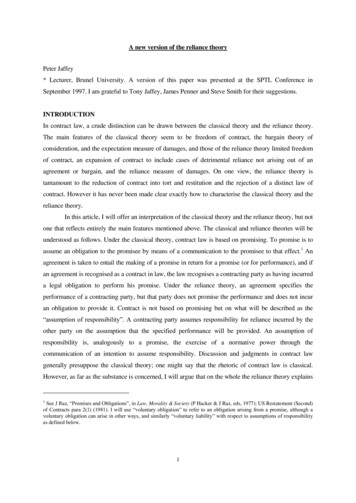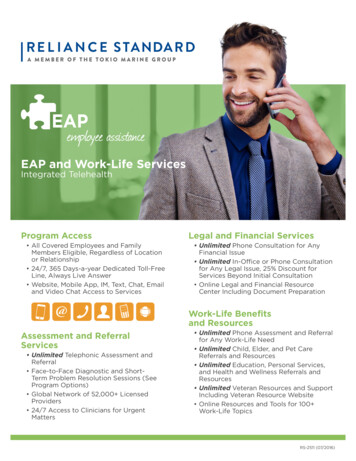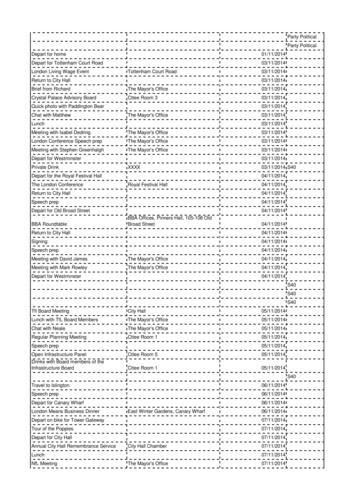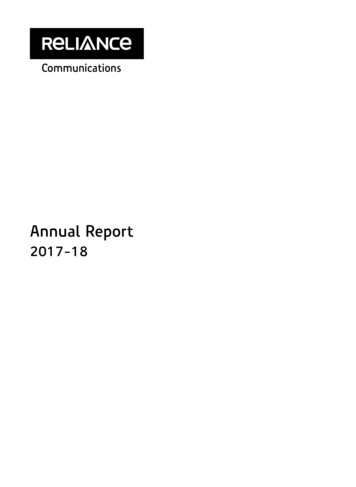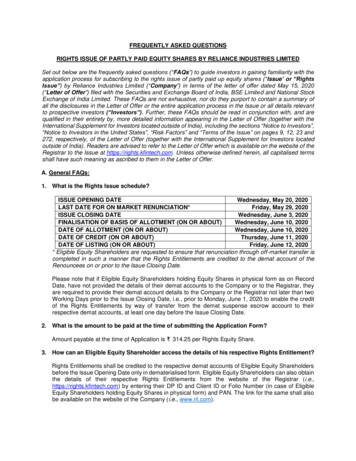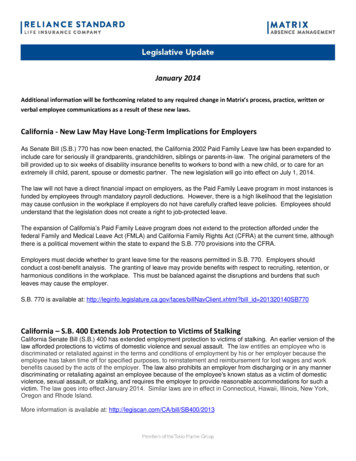
Transcription
January 2014Additional information will be forthcoming related to any required change in Matrix’s process, practice, written orverbal employee communications as a result of these new laws.California - New Law May Have Long-Term Implications for EmployersAs Senate Bill (S.B.) 770 has now been enacted, the California 2002 Paid Family Leave law has been expanded toinclude care for seriously ill grandparents, grandchildren, siblings or parents-in-law. The original parameters of thebill provided up to six weeks of disability insurance benefits to workers to bond with a new child, or to care for anextremely ill child, parent, spouse or domestic partner. The new legislation will go into effect on July 1, 2014.The law will not have a direct financial impact on employers, as the Paid Family Leave program in most instances isfunded by employees through mandatory payroll deductions. However, there is a high likelihood that the legislationmay cause confusion in the workplace if employers do not have carefully crafted leave policies. Employees shouldunderstand that the legislation does not create a right to job-protected leave.The expansion of California’s Paid Family Leave program does not extend to the protection afforded under thefederal Family and Medical Leave Act (FMLA) and California Family Rights Act (CFRA) at the current time, althoughthere is a political movement within the state to expand the S.B. 770 provisions into the CFRA.Employers must decide whether to grant leave time for the reasons permitted in S.B. 770. Employers shouldconduct a cost-benefit analysis. The granting of leave may provide benefits with respect to recruiting, retention, orharmonious conditions in the workplace. This must be balanced against the disruptions and burdens that suchleaves may cause the employer.S.B. 770 is available at: ent.xhtml?bill id 201320140SB770California – S.B. 400 Extends Job Protection to Victims of StalkingCalifornia Senate Bill (S.B.) 400 has extended employment protection to victims of stalking. An earlier version of thelaw afforded protections to victims of domestic violence and sexual assault. The law entitles an employee who isdiscriminated or retaliated against in the terms and conditions of employment by his or her employer because theemployee has taken time off for specified purposes, to reinstatement and reimbursement for lost wages and workbenefits caused by the acts of the employer. The law also prohibits an employer from discharging or in any mannerdiscriminating or retaliating against an employee because of the employee's known status as a victim of domesticviolence, sexual assault, or stalking, and requires the employer to provide reasonable accommodations for such avictim. The law goes into effect January 2014. Similar laws are in effect in Connecticut, Hawaii, Illinois, New York,Oregon and Rhode Island.More information is available at: http://legiscan.com/CA/bill/SB400/2013Prepared by Human Analytics, LLC
California – Senate Bill 288 Extends Job Protection to Victims of CrimePreviously, employers were prohibited from discharging or in any manner discriminating against an employee fortaking time off to serve on a jury, an employee who is a victim of a crime for taking time off to appear in court as awitness in any judicial proceeding, or an employee who is a victim of domestic violence or a victim of sexual assaultfor taking time off from work to obtain or attempt to obtain prescribed relief.This bill would additionally prohibit an employer from discharging or in any manner discriminating or retaliatingagainst an employee who is a victim of specified offenses for taking time off from work, upon the victim’s request, toappear in court to be heard at any proceeding, including any delinquency proceeding, involving a post-arrest releasedecision, plea, sentencing, post-conviction release decision, or any proceeding in which a right of the victim is atissue. The bill would also extend those aforementioned protections, including, but not limited to, reinstatement andreimbursement, to an employee who is a victim of specified offenses for taking time off from work to appear at sucha court proceeding.More information is available at: http://www.leginfo.ca.gov/pub/13-14/bill/sen/sb 02510300/sb 288 bill 20131011 chaptered.pdfOregon – New Bereavement Leave Policy Impacts Oregon Family Leave Act (OFLA)Effective January 1, 2014, Oregon employees covered under the Oregon Family Leave Act (OFLA) are eligible totake up to two (2) weeks of unpaid leave for the death of a family member. Under the revised Act, employees maytake leave to attend a funeral or alternative ceremony, make arrangements necessitated by the death of a familymember, or to grieve.Employees may take leave for the death of a spouse, same-sex domestic partner, child (biological, adopted, foster,stepchild or otherwise), parent, parent-in-law, grandparent, grandchild, or same-sex domestic partner’s parent orchild. Nothing in the law requires the leave to be paid, nor does it expand the annual amount of OFLA leavecurrently provided.More information available at: http://gov.oregonlive.com/bill/2013/HB2950/Rhode Island – Temporary Caregiver Insurance ProgramBeginning January 2014, the new Temporary Caregiver Insurance Program (TCI) was signed into law on July 11,2013. TCI will provide eligible claimants up to four weeks of caregiver benefits to care for a seriously ill child,spouse, domestic partner, parent, parent-in-law or grandparent or to bond with a newborn child, new adopted childor new foster-care child.TDI provides benefit payments to insured RI workers for weeks of unemployment caused by a temporary disabilityor injury. It protects workers against wage loss resulting from a non-work related illness or injury, and is fundedexclusively by Rhode Island workers. Unlike other statutory programs, benefits in Rhode Island can only beprovided by the State.For More Information: http://www.dlt.ri.gov/tdi/Prepared by Human Analytics, LLC
Connecticut – 2014 Report of Task Force StudyIn 2013, Special Act 13-13 created a task force to study the feasibility of creating short-term family medical leaveinsurance benefits to workers who are unable to work due to (1) pregnancy or the birth of a child, (2) a non-workrelated illness or injury, or (3) the need to care for a seriously ill child, spouse or parent. The task force will submit itsreport to the joint standing committees of the General Assembly no later than October 1, 2014.San Francisco, CA – Family Friendly Workplace Ordinance Goes into EffectThe Ordinance amends the Administrative Code to allow San Francisco-based employees to request flexible orpredictable working arrangements to assist with care giving responsibilities, subject to the employer’s right to deny arequest based on business reasons; to prohibit adverse employment actions based on caregiver status; to prohibitinterference with rights or retaliation against employees for exercising rights under the Ordinance; to requireemployers to post a notice informing employees of their rights under the Ordinance; to require employers tomaintain records regarding compliance with the Ordinance; to authorize enforcement by the Office of LaborStandards Enforcement, including the imposition of remedies and penalties for a violation and an appeal process foran employer to an independent hearing officer; and to authorize waiver of the provisions of the Ordinance in acollective bargaining agreement; and making environmental findings. The Ordinance is effective January 1, 2014.For more information: tid 10583Proposed Federal LegislationSponsored by Rep. Rosa DeLauro (D – Conn.) and Sen. Kirsten Gillibrand (D – N.Y.), the Family and MedicalInsurance Leave Act (FAMILY Act) would ensure people have some income during family or medical leave.The FAMILY Act would provide workers with up to 12 weeks of partial income when they take time for their ownserious health condition, including pregnancy and childbirth recovery; the serious health condition of a child, parent,spouse or domestic partner; the birth or adoption of a child; and/or for particular military caregiving and leavepurposes. Workers would be able to earn 66 percent of their monthly wages, up to a capped amount. The proposedAct would cover workers in all companies, no matter their size. Younger, part-time, lower-wage and contingentworkers would be eligible for benefits. The plan will be funded by small employee and employer payrollcontributions of two-tenths of one percent each (two cents per 10 in wages), or about 1.50 per week for a typicalworker. The proposed plan would be administered through a new Office of Paid Family and Medical Leave withinthe Social Security Administration. Payroll contributions would cover both insurance benefits and administrativecosts.For more information: y-medical-leave dfNew Definition of Spouse under FMLA Expected from DOLThe November regulatory agenda of the Department of Labor indicated that the Wage and Hour Division is planningto propose a rule in March 2014 that would revise the FMLA's definition of “spouse” based upon the U.S. SupremeCourt's decision in United States v. Windsor, 133 S. Ct. 2675 (2013). In Windsor, the justices struck down theDefense of Marriage Act's exclusion of state-sanctioned, same-sex marriages from the federal definition ofmarriage.Prepared by Human Analytics, LLC
For more information: html or 88/Same Sex Marriage UpdateSame sex marriages are now permitted in 18 States and the District of Columbia. Those states include California,Connecticut, Delaware, Hawaii, Illinois, Iowa, Maine, Maryland, Massachusetts, Minnesota, New Hampshire, NewJersey, New Mexico, New York, Rhode Island, Utah, Vermont, and Washington. The Illinois law permitting samesex marriages will take effect on June 1, 2014. In light of the decision in Windsor, and the dynamic legislativechanges that have occurred with this issue within the past few years, employers should be monitoring for changesand developments closely. Utah has recently requested an emergency stay from the United States Supreme Courtto block same sex marriages within the state while the state appeals a judicial decision to overturn the previous ban.EEOC to Become More Active Against Disability-Based DiscriminationIn the Fall 2013 regulatory agenda, the EEOC has indicated that 2014 will provide a greater focus on disabilitybased employment discrimination.For more information: http://op.bna.com/dlrcases.nsf/id/kmgn-9dwmvf/ File/EEOCfall2013agenda.pdf2014 Summary of Statutory Disability PlansStateMaximum Weekly BenefitContribution AmountCalifornia 1,075 per week1.0% of the first 101,636 in annual earnings to amaximum of 1,016.36 per yearHawaii 546 per week0.5% of the first 940.05 in weekly earnings to amaximum of 470 per week.New Jersey 595 per week0.38% of the first 31,500 in annual earnings to amaximum of 119.70 per year.New York 170 per week.5 of the first 120 in weekly earnings to a maximum of 0.60 per weekPuerto Rico 113 per week.3% of the first 9,000 in earnings to a maximum of 27.00 per yearRhode Island 752 per week1.2% of the first 62,700 in earnings to a maximum of 752.40 per yearNotable CasesTillman v. Ohio Bell Telephone Co.6th Cir. App. Ct. No. 11-3857 (2013)This case demonstrates how an employer can protect itself in detecting abuse of FMLA usage. After beingdiagnosed with a back condition, the employee utilized FMLA leave frequently on an intermittent basis. FMLAPrepared by Human Analytics, LLC
requests were often made during weekends, holidays and vacation periods. The employee even advised theemployer that he would be utilizing FMLA leave if he were assigned to evening shift.The employer calendared the leave and noted the suspicious nature of the requests. The employer alsoconducted surveillance and observed the employee working in his yard and garage, driving, and running errandswhile on FMLA leave. These errands included visits to sporting goods and department stores. The employer alsohired a medical consultant that provided an opinion that the activities of the employee were not consistent with anindividual suffering from an incapacitating back condition. After interviewing the employee, the companysubsequently terminated him. The employee later sued for interference and retaliation violations under the FMLA.The court determined that the employer had a “honest belief” in FMLA fraud, and that the belief was basedupon reasonable reliance of the evidence that it had obtained. This case provides specific guidance to proceduresthat employers can undertake to prevent or address FMLA fraud. These measures include: having a formal policyagainst FMLA abuse; requiring medical certification; looks for patterns of abuse and suspicious timing of leave;conduct surveillance; review correspondence with the employee (including e-mails); utilize objective medicalopinions; and, get the employee’s side of the story.For more information: http://hr.cch.com/ELD/TillmanOhioBell.pdfBrookins v. Staples Contract and Commercial Inc. D. Mass., Civil Action No. 11-11067-RWZ (2013)Ronita Brookins was an employee of Staples in Massachusetts. She missed multiple days of work due tocancer treatments. She was advised by her employer to apply for FMLA leave. The employer provided a medicalcertification and advised her to return the form within 15 days to protect any further absences. The employee failedto return the form in a timely manner, and subsequently requested an extension of time to complete the certification.The employer denied the FMLA leave, and three weeks later terminated the employee due to unexcused,unprotected absences. The employee sued for FMLA interference and retaliation, as well as claims for disabilitydiscrimination and failure to accommodate under Massachusetts law.The court determined that Brookins did not have a valid FMLA interference claim because the employee didnot meet her obligations to return the medical certification within the 15 day period. The court noted that employeesmust use diligent good-faith efforts, and that employees are limited to the 15 day period unless such a time period isnot practical under the specific circumstances. The retaliation claim failed when the court noted that Brookins hadtwo previous leaves, and coworkers had taken FMLA leave without any negative consequences. The courtdismissed the state-law based claims due to a lack of evidence.This case reveals that employees must also comply with the requirements of the FMLA, and that employeesmust put forth reasonable efforts in exercising FMLA rights. It should be noted that what is deemed to bereasonable may vary with particular facts and circumstances, location or a specific judge or jury.Department of Labor v. DNA Diagnostics Center Inc., S.D. Ohio, No. 1:2013-cv-00874The Department of Labor has filed suit against an Ohio employer for denying an employee benefitsrequested under the FMLA. The worker was the temporary guardian of her seriously ill 12-year-old niece andrequested leave for the health care of the child. The employer denied the leave, and later terminated the employeewhen she took leave to care for her niece.Prepared by Human Analytics, LLC
The Department has previously issued an administrator interpretation providing that an employee whoassumes the role of caring for a child receives parental rights to family leave regardless of the legal or biologicalrelationship. The matter is currently pending.Mercer v. the Arc of Prince Georges County Inc., 4th Cir., No. 13-1300Adesina Mercer was off work on FMLA leave when co-workers discovered that her job performance prior toleave was lacking. As a benefits coordinator, she had failed to obtain and maintain benefits for 99 of 160 clients.While on FMLA leave, she received a letter from her employer notifying her of termination. She subsequently filed alawsuit in the federal district court of Maryland, alleging interference with FMLA rights and retaliation. The 4th CircuitCourt of Appeals determined that previously unknown poor performance is a sufficient basis for terminating anemployee, even if the evidence is discovered during leave granted under the FMLA.Attiogbe-Tay v. SE Rolling Hills LLC (D. Minn. 11/7/13)The employee utilized 12 weeks of FMLA leave after knee replacement surgery. At the end of 12 weeks,the employee returned, but provided a medical note with six weeks of work restrictions. The employee requested anadditional 6 weeks of leave as a reasonable accommodation under the ADA. The employer subsequentlyterminated the employee. The EEOC has previously indicated that a capped leave of absence is an ADA violation.The employee filed suit, alleging that the failure to provide an additional six weeks of leave was a violation ofthe ADA. The court determined that the request created an undue hardship on the employer. Although these casesare quite fact specific, employers should be sure to document the nature of the hardship, including, costs to theemployer, burden on the workforce, resources of the employer (financial, human resources, size, etc.), impact onthe final product, customer or employee relations.Additional information will be forthcoming related to any required change in Matrix’s process, practice or written orverbal employee communications as a result of these new laws.What You Need to Do:Reliance Standard and Matrix are committed to keeping our clients informed and in compliance. We will provideupdates on meaningful changes ‐ and how they may affect our clients – as necessary. In the interim, for moreinformation on how to manage productivity in the face of this and other employee leave legislation, contact yoursales representative or account manager.Prepared by Human Analytics, LLC
Rhode Island - Temporary Caregiver Insurance Program Beginning January 2014, the new Temporary Caregiv er Insurance Program (TCI) was signed into law on July 11, 2013. TCI will provide eligible claimants up to four weeks of caregiver benefits to care for a seriously ill child,
